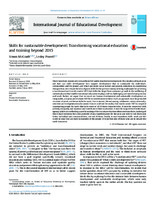Skills for sustainable development: Transforming vocational educationand training beyond 2015
Abstract
There have been recent calls to transform VETand to transform development. This double call leads us toask how can skills development best support development that is sustainable for individuals,communities and the planet, and which promotes social justice and poverty reduction. In consideringthis question, we critique the idea of green skills for the green economy as being inadequate for achievinga transformed and transformative VET that shifts the target from economic growth to the wellbeing ofindividuals and that enables vocational education to play a role in challenging and transforming societyand work. Rather, we argue that we must see human development and sustainable development asinseparable, and plan and evaluate VET for its contribution to these. Such an approach must be groundedin a view of work, and hence skills for work, that is decent, life-enhancing, solidaristic, environmentally-[68_TD$DIFF]sensitive and intergenerationally-aware. It must confront the reality that much current VET is complicitin preparing people for work that lacks some or all of these characteristics. It must be concerned withpoverty, inequality and injustice and contribute to their eradication. It must be supportive of individuals'agency, whilst also reflecting a careful reading of the structures that too often constrain them. In doing allthis it must minimise the costs and risks of any transformation for the poor and seek to lock them intobetter individual and communal lives, not out of them. Finally, it must transform skills, work and theworld in ways that are truly sustainable of the people of today but also of those who are to inhabit theearth tomorrow.

